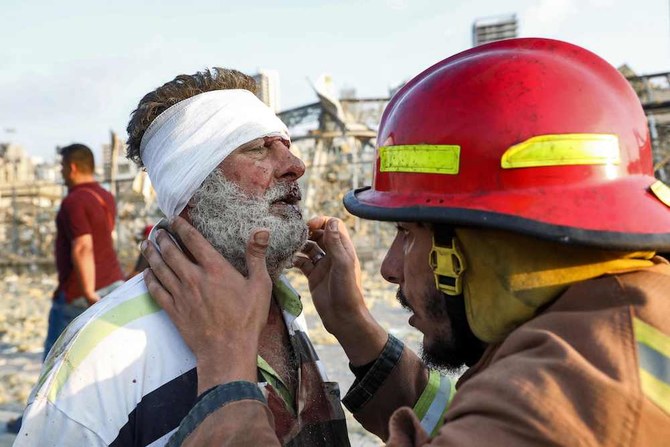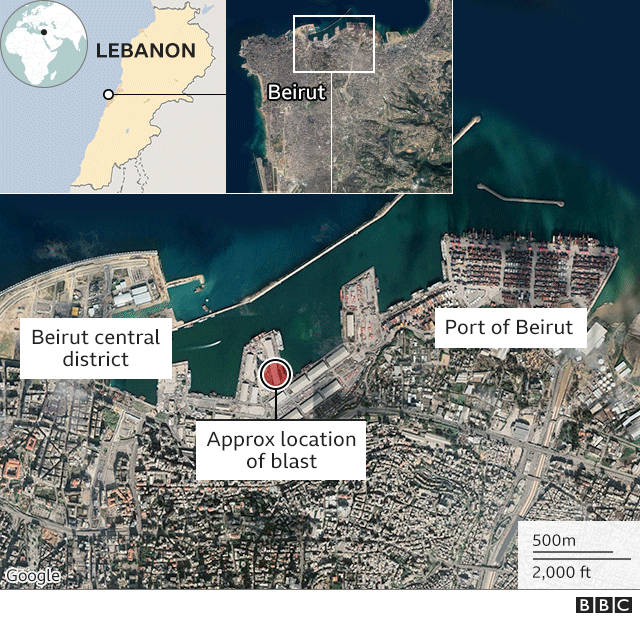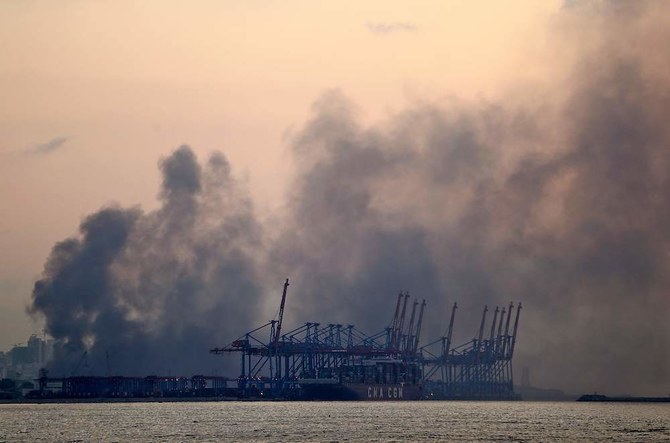Two massive explosions in Beirut killed at least 10 people, wounded hundreds and caused extensive damage across the Lebanese capital.
The blasts took place at the city’s port area and were so large the explosions were felt in Cyprus 200 kilometers away.
Even in a city with a history of conflict, the scale of the explosions was unprecedented.
Videos showed an initial blast and fire, followed by a massive explosion and shockwave spreading through the city’s buildings.
People could be heard screaming and running for cover in restaurants and from balconies.
What Is Happening Now?
A large blast in the Lebanese capital, Beirut, has caused widespread damage, injuring hundreds of people, the Lebanese Red Cross says.
It is not yet clear what caused the explosion in the city’s port region. Video posted online showed a large mushroom cloud and destroyed buildings.
Hospitals are said to be overwhelmed by casualties.
Lebanon’s internal security chief said the blast happened in an area housing highly explosive materials.
The port zone was cordoned off by the security forces, allowing access only to a string of ambulances, fire trucks and people whose relatives were working inside the devastated area, while others were screaming to be let through.
A huge blaze was burning at the port, where ambulances were rushing away the wounded, their sirens wailing.
The blasts were heard as far away as Nicosia on the eastern Mediterranean island of Cyprus, 240 kilometers (150 miles) away.

The explosion comes at a sensitive time for Lebanon, with an economic crisis reigniting old divisions. Tensions are also high ahead of Friday’s verdict in a trial over the killing of ex-Prime Minister Rafik Hariri in 2005.
Lebanese Health Minister Hamad Hasan has spoken of many injuries and extensive damage, and the Lebanese Red Cross says hundreds of people have been taken to hospital.
A BBC journalist at the scene reported dead bodies and severe damage – enough to put the port out of action.
Reuters news agency quotes sources as saying 10 bodies have been pulled from the wreckage.
The cause of the explosion is still not known, but some reports suggest it may have been an accident. Lebanon’s National News Agency reported a fire breaking out at what it called an explosives depot at the port before the explosion.

A large building in the port, which is close to the city centre, was blown apart.
Local media showed people trapped beneath rubble. A witness described the first explosion as deafening. Video footage showed wrecked cars and blast-damaged buildings.
Reports From Eye-Witnesses
I saw the fire, but I didn’t yet know there was going to be an explosion. We went inside. Suddenly I lost my hearing because apparently I was too close. I lost my hearing for a few seconds, I knew something was wrong.
And then suddenly the glass just shattered all over the car, the cars around us, the shops, the stores, the buildings. Just glass going down from all over the building.
Literally all over Beirut, people were calling each other from different areas kilometres away and they were experiencing the same thing: broken glass, buildings shaking, a loud explosion.
Actually we were shocked because usually when it happens, just one area will experience those happenings after an explosion, but this time it was all of Beirut, even areas outside of Beirut.

The videos and images, not just of the massive cloud of smoke erupting in Beirut but the damage and devastation it is caused kilometres away, have triggered a new wave of shock and anxiety in Lebanon, which is already teetering on the brink of a catastrophic economic collapse.
Just hours before the blast, anti-government protesters had been scuffling with the security forces outside the ministry of energy, demanding yet again accountability from the country’s leaders.
There have been grave warnings of hunger in the streets or a reigniting of sectarian conflict if the economy worsens.
And the blast will remind many of the bomb that killed Rafik Hariri. The Lebanese will be hoping that this latest blast will remain a human tragedy – an accident – and not a premeditated act.
Scenario Pre-Explosions In Lebanon
Lebanon is experiencing political turmoil, with street demonstrations against the government’s handling of the worst economic crisis since the 1975-1990 civil war.

There has also been tension on the border with Israel, which said last week that it had thwarted an attempt by Hezbollah to infiltrate Israeli territory. But a senior Israeli official has told the BBC that “Israel has no connection” to the Beirut blast.
Lebanon is already suffering its worst economic crisis in decades, which has left nearly half of the population in poverty.
Lebanon’s economy has collapsed in recent months, with the local currency plummeting against the dollar, businesses closing en masse and poverty soaring at the same alarming rate as unemployment.
The blast happened close to the scene of a huge car bombing which killed ex-PM Rafik Hariri in 2005. Tuesday’s blast also came days before the long-awaited verdict in the trial at a special court in the Netherlands of four men accused of orchestrating the attack.






Leave a Reply
You must be logged in to post a comment.